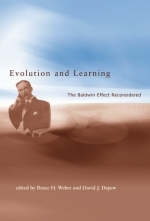
Evolution and Learning
The Baldwin Effect Reconsidered
Seiten
2003
Bradford Books (Verlag)
978-0-262-23229-6 (ISBN)
Bradford Books (Verlag)
978-0-262-23229-6 (ISBN)
- Titel ist leider vergriffen;
keine Neuauflage - Artikel merken
These essays discuss the Baldwin effect, how it was modified over time, and its possible contribution to contemporary empirical and theoretical evolutionary studies. Topics include: modern evolutionary synthesis; nature and niche construction in evolutionary theory; and consciousness and language.
The role of genetic inheritance dominates current evolutionary theory. At the end of the nineteenth century, however, several evolutionary theorists independently speculated that learned behaviors could also affect the direction and rate of evolutionary change. This notion was called the Baldwin effect, after the psychologist James Mark Baldwin. Philosophers and theorists of a variety of ontological and epistemological backgrounds have begun to employ the Baldwin effect in their accounts of the evolutionary emergence of mind and of how mind, through behavior, might affect evolution. The essays in this book discuss the originally proposed Baldwin effect, how it was modified over time, and its possible contribution to contemporary empirical and theoretical evolutionary studies. The topics include the effect of the modern evolutionary synthesis on the notion of the Baldwin effect, the nature and role of niche construction in contemporary evolutionary theory, the Baldwin effect in the context of developmental systems theory, the possible role of the Baldwin effect in computational cognitive science bio-semiotics, and the emergence of consciousness and language.
The role of genetic inheritance dominates current evolutionary theory. At the end of the nineteenth century, however, several evolutionary theorists independently speculated that learned behaviors could also affect the direction and rate of evolutionary change. This notion was called the Baldwin effect, after the psychologist James Mark Baldwin. Philosophers and theorists of a variety of ontological and epistemological backgrounds have begun to employ the Baldwin effect in their accounts of the evolutionary emergence of mind and of how mind, through behavior, might affect evolution. The essays in this book discuss the originally proposed Baldwin effect, how it was modified over time, and its possible contribution to contemporary empirical and theoretical evolutionary studies. The topics include the effect of the modern evolutionary synthesis on the notion of the Baldwin effect, the nature and role of niche construction in contemporary evolutionary theory, the Baldwin effect in the context of developmental systems theory, the possible role of the Baldwin effect in computational cognitive science bio-semiotics, and the emergence of consciousness and language.
Bruce H. Weber is the Robert Woodworth Professor of Science and Natural Philosophy at Bennington College and Professor of Biochemistry at California State University at Fullerton. David J. Depew is Professor of Communication Studies and Rhetoric of Inquiry at the University of Iowa.
| Erscheint lt. Verlag | 13.7.2003 |
|---|---|
| Reihe/Serie | Life & Mind: Philosophical Issues in Biology & Psychology |
| Zusatzinfo | 12 |
| Verlagsort | Massachusetts |
| Sprache | englisch |
| Maße | 152 x 229 mm |
| Gewicht | 612 g |
| Themenwelt | Geisteswissenschaften ► Psychologie |
| Naturwissenschaften ► Biologie ► Evolution | |
| ISBN-10 | 0-262-23229-4 / 0262232294 |
| ISBN-13 | 978-0-262-23229-6 / 9780262232296 |
| Zustand | Neuware |
| Haben Sie eine Frage zum Produkt? |
Mehr entdecken
aus dem Bereich
aus dem Bereich
Komplette Neuübersetzung. Mit einem Nachwort von Josef H. Reichholf.
Buch | Hardcover (2018)
Klett-Cotta (Verlag)
48,00 €
Wie die Vernichtung der Arten unser Überleben bedroht - Der …
Buch | Softcover (2023)
Penguin (Verlag)
15,00 €


